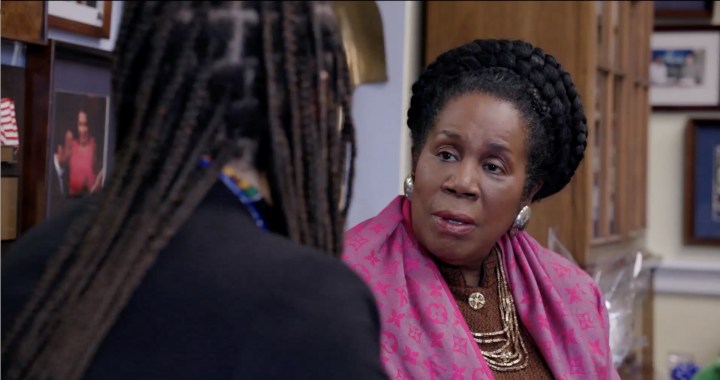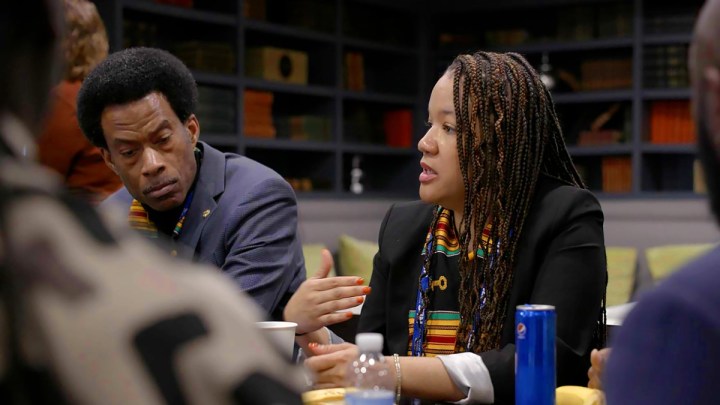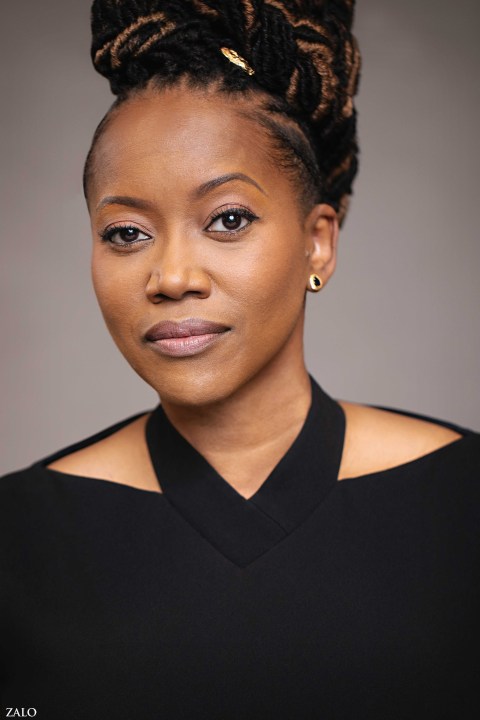When Erika Alexander (Living Single, John Lewis: Good Trouble) and Whitney Dow (Two Towns of Jasper, Whiteness Project) first set out to creat a prjct about reparations, they expected to make a thesis film about the debate surrounding H.R. 40, a 30-year-old Congressional bill that would establish a commission to study slavery and consider reparations for Black Americans. Plans shifted upon meeting Alderman Robin Rue Simmons and learning of her pursuit to pass the first government-funded reparations program in Evanston, Illinois.
The result became The Big Payback, a documentary that follows Simmons’s efforts in Evanston and the fight to pass H.R. 40. Featuring interviews with Simmons, Congresswoman Sheila Jackson Lee (D-Texas), and other community leaders, The Big Payback is a view into the legislation behind reparations and how it affects communities on a local and national level. In an interview with Digital Trends, co-directors Alexander and Dow explain the definition of reparations and discuss the arguments for and against reparations, and as well as who should be responsible for paying the debt.

Note: This interview has been edited for length and clarity.
Digital Trends: I want to start with the definition of reparations because most people believe it’s just money. That does represent a huge portion of it, but after watching the documentary, you find out there are more elements to reparations than just the financials. To you, what is the definition of reparations?
Erika Alexander: Reparations is the making of amends for a wrong one has done by paying money to, [therefore] helping, those who have been wronged. Or compensation paid by a defeated state. That’s really what it is. In this sense, it’s reparations for the descendants of the enslaved Africans and their descendants by the U.S. government for harm, not only from slavery, but from Jim Crow policies, legislation, [and] all these things that have been interred in the American fabric. They would like them to see to it, address it, and give an apology with no conditions.
Whitney Dow: Yeah, I just typed it in a GPT chat to see what it says [laughs]. It’s the action of repairing a wrong. And I think it works in two directions. What’s interesting about reparations, for me, is that it’s really about repairing an injury. Whether it’s making amends, making an apology, [or] making monetary payments, I think when people think of reparations, and Erika has talked about this a fair amount before, it’s not just the idea of just repairing the injury to Black people, but it’s repairing the relationship.
It’s repairing the relationship between Black and White Americans. It also means repairing White people. As a White person, I believe you’re living in a state of cognitive dissonance where you are trying to manage this story that you’ve told about yourself, which has some holes in it. It’s really hard to keep holding that in play, so I think that part of the repair is also for the White community to repair itself.
How did your partnership start on this project? When did you decide to partner?
Alexander: Joy Reid. Do you want to tell the story, Whitney? The great Joy Reid is a friend of both of ours.
Dow: Yes. We both weirdly vectored through Joy Reid. I was talking to her, and Erika was talking to her, and she said, “You got to meet my friend Erika. She’s interested in reparations.” And she said, “Erika, you don’t want to meet my friend Whitney [laughs].” We met, and we really hit it off. I think one of the interesting parts of this thing, and I’m not going to sugarcoat it, is this work is really hard.
Working on a subject as complex and fraught as race relations is hard. Working on a subject about reparations is even harder, but working on it in a shared control capacity across race and across gender creates a lot of challenges. I was lucky enough to have a partner in Erika. Sometimes, it’s more important to have shared goals than shared motivations. I think that we always had the same shared goal. And Joy, for whatever reason, saw that in us when she put us together.

This project started with the congressional reparations hearing in 2019 with Rep. Jackson Lee and H.R. 40. For people who may not understand the specifics or intent of the bill, what is H.R. 40?
Alexander: H.R. 40 is a study bill that’s in Congress. It was first introduced by Congressman John Conyers [D-Michigan] as a bill to study reparations and their effects. And to make recommendations …
Dow: For appropriate remedies.
Alexander: For appropriate remedies. By the way, that was going to be the name of this film, Appropriate Remedies. It was that or The Big Payback. Whitney wanted Appropriate Remedies, and I wanted The Big Payback.
Dow: I didn’t want to scare White people. I was like, “The Big Payback? The Big Payback’s coming. Holy shit! Let’s get out of here!” [laughs]
Alexander: But you know what I said? I said, “Scare White people? You scaring everybody off. Nobody wants to see a movie called Appropriate Remedies.” I said this sounds like a drug for constipation. So I said, “We’re not gonna do that here.” Just so you know, Dan, how we solve things, because of reparations, I always win. That’s just what it’s going to be. Appropriate Remedies. Lord? Mm [shakes head]. That’s what H.R. 40 is. It’s been stuck there for 30 years, and Sheila Jackson Lee moved it for at least a House vote.
Dow: We got access to the Judiciary Committee hearings. We got access to film the markup session of the bill. We filmed the debate in the markup session, and it was voted out of committee. It was not only the first time it was voted out, but it was the first time it was even brought to a vote.
John Conyers would submit this bill for 30 years. The committee would refuse to even take it up for debate, let alone a vote. Representative Jackson Lee managed to not only get it voted out of committee but also has close to 200, if not over 200, co-sponsors on the bill. It’s just a question of whether the leadership will bring it to the floor. We’ll see if [Republican House Speaker] Kevin McCarthy wants to bring this to the floor.
Alexander: That’s why they’re looking for an executive order from [President Joe] Biden to bypass that and get on with it.
Do you think it will ever happen while Biden’s in office?
Alexander: I think it must happen. I don’t know if it will ever happen. That’s a good question. Everything is a political calculation, and I can see why he avoided it before these past elections. After a while, especially for Black people, they’re looking at it like you can’t keep pushing this to the side. Not only is it not fair, but it’s wrong.
No one should be that afraid or calculate that it might harm them the most if they did it. It’s already harming not only Black people but all sorts of people. Poor people and all these other people have been harmed by policies that they put in to stop or deny Black people, but it ended up denying poor Whites and everyone else, so it needs to be handled.
While filming in 2019, you get this message about Alderman Robin Rue Simmons, someone who is tackling reparations at a local level in Evanston. Take me through how and why you decided to shift the point of view to Alderwoman Simmons.
Dow: Well, when we really started making the film, it was a very, very different film. It was more of a thesis film. It was shooting a lot of people in the studio on a green screen. It was going to have animation and archival [footage] and a B-roll. We were going to use the debate around H.R. 40 as a bit of a narrative engine to carry it through. About a few months into filming, one of our producers saw this article on Robin Rue Simmons that she had passed this bill. There was going to be an event that opened the film at the church, where they announced this program to the community.
We jumped on a plane and flew out there, put a crew together, and started filming. We said to ourselves that we were really making a film about how history manifests in the present. Well, here is actual history being made in the present, so it really became a way of doing this micro and macro story. We have this national story taking place at a glacial pace, and then we have this representational local story that allowed us to really unpack the details of how something like this works.
What stood out about Alderman Simmons during this process? When did you know you made the right decision to shift the film toward her work?
Alexander: I think we did know right away: She is extraordinary. She has a beautiful way about her, and it’s easy. But she was also very honest. Very soon after we arrived, she said, “Well, I don’t really know if I should do this.” But she knew she wanted to do this for the community. They needed to know how it was documented.
Even though she was hesitant as a person, she understood her place in history right away. This was going to be something extraordinary. She also naively thought, “Oh. I’m going to do this, and then the cameras will go away. It will all be over, and I’ll be back to my old life.” We looked at her and laughed and said, “Is she crazy? She’s the Rosa Parks of reparations.”
I was sad for her because she would never have that again. She could never go back. You can never put all that in the box. At all times, she would say that she was worried about how she was coming off, not out of any ego, but because she wanted people to know where her anxiety was.
I thought that type of honesty should be — and I think Whitney did as well — rewarded with us always being honest with her. We had a really great dialogue going back and forth as filmmakers to a woman who was becoming, like Michelle Obama would say, “living out loud,” under a lot of pressure, allowing us to watch her.

A common argument against reparations would be when people say, “There weren’t my crimes. Why should I be the one to pay that debt?” How do you approach those people and counter those viewpoints to explain where you’re coming from?
Dow: What did Falkner say? “The past is never dead. It’s not even past.” It isn’t. There are two ways that I approach it. One is that the data is incontrovertible. If you look at the data trends — wealth, education levels, mortgage rates, health, or death rates — there is an intransient gap between Black and White Americans. Some of the data I’m sure you probably know is that White Americans have up to 11 to 14 times the wealth of Black Americans.
This idea that somehow this magically happened … of course, the past exists in the present. That was actually what we first set out to really try and see. A documentary is relatively simple. It’s hard to do complex things. A book could be written about it. A really complex book about how Evanston systematically excluded Black Evanstonians from participating civically and participating in the institutions and things that allowed them to build wealth.
Imagine a poker game where people have been cheating. You’ve been playing against someone who has been cheating for like 400 years, and you catch them cheating. They go, “Oh, yeah. You’re right. I’m sorry. That was so bad. I was cheating. I admit I was cheating. Cheating is terrible. I’m never going to cheat again. But now, you can’t cheat, either. You all have to play by the rules, and I’m keeping all the chips.”
That’s kind of the situation we’re in. The chips have been gathered on this side of the table. In the 1960s and 1970s, White Americans made this idea like, “We’ll pass civil rights. We agree that this is bad, but we’re still not willing to compensate for the cheating we did over those decades and centuries.”
Who should pay the reparations? Does this fall squarely upon the federal government?
Alexander: Whitney will talk about the corporate end, and I will talk about the government. Yes, it is the government’s debt to pay. Let’s be clear about that. We are in America, and they were the ones who allowed these things to happen for so long to specific people and then, afterward, allowed corporations and all sorts of other institutions to create laws and legislation directly against Black Americans.
It still goes on to this day. You look at the redlining now, but also what they do with the voting in the polls and all that stuff. It still goes on. I hate to say it, but it’s destroying not Black people, [but] it’s destroying America. The debt is theirs to pay. I should say ours to pay, [or] hers [America] to pay. And we’re looking forward to her figuring it out.
Dow: What I really like about this film is that it addresses both questions. Yes, I believe there’s a national debt to pay, and that is the federal government. The federal government benefited through taxes. The federal government created the policies that created some of these injuries and inequities. But it’s also local communities’ responsibility to look at their own place in the paradigm, their own place in the equation, and decide the specific way that this has manifested itself here.
In Evanston, it happened to be around redlining real estate. If you went to Jackson, Mississippi, it might be something different. If you go to San Diego, California, it’s something different. What I like about this story is communities saying, to answer that earlier question you asked, “Yeah. I wasn’t involved in slavery, but this echo of legacy passed through every community in this country.” I think it’s a productive exercise and healing of sorts, and an exercise that will make a more positive, stronger community if you examine your role and how it manifests in your community.

So Evanston came up with this idea of saying this is how it manifested here, so this is how it needs to be addressed.” Your question about who should pay. One of the most interesting things, it’s funded by a tax on legal marijuana. She [Simmons] saw this opportunity for this new tax.
White people used to say when I would meet in Evanston that they’re so proud of this, [and] so proud of Evanston that they’re doing this reparations program. I said,” What are you proud about? You didn’t propose this thing. You didn’t pass this thing.” It’s a syntax. If you don’t buy weed, it doesn’t touch you. How and why are you proud?
One of the things that happened recently, which makes me really excited, is they created a property tax that they’re now going to add to the fund. That, to me, is a much more interesting way to do it. If this is Evanston’s problem, everybody should contribute to the reparations to try and create healing.
Initially, I think it was a good way in. You know, get your foot in the door first. Then they try and slam it, but you get the body in a little farther, and I think that’s by opening that door. What Robin did, and we’ve said this a number of times before, is that she showed that the impossible was possible. It’s like the four-minute mile. Once you break it, that time keeps coming down. So once she showed that it was possible, all things are possible in this realm.
Alexander: I do have to say, Whitney, that they did send representation, and they did pass it from a mostly White council, which is, to me, extraordinary. We have to give Evanston props for that. Also, knowing that it’s a moral debt that America must pay, and in that way, that’s more of a reckoning in people’s hearts, to keep denying that not being there is a reason why they shouldn’t pay. Well, the Japanese were put into internment camps, and then in 1988, they actually did pay reparations to the tune of about $1.6 billion once it was all spread out. They at least looked at that and got that done.
You can’t keep pushing this down the hill because of age. The slaves had no rights. They had no representation. So to say they should have gotten it done, I’m like, “How? How could they have gotten it done when everybody around them hated them and was hunting them and using them, not just for work, but for whatever they wanted? We have to go, “Of course, they didn’t have any way to create this, but we do, so let’s figure it out.”
The Big Payback makes its television debut on PBS’ Emmy award-winning documentary anthology series Independent Lens to commemorate Martin Luther King Jr. Day at 10 p.m. ET on January 16, 2023 (check local listings). The film will also be available to stream on the PBS Video app.
Editors' Recommendations
- Josh Johnson heads to therapy in new comedy special Up Here Killing Myself
- Outta the Muck directors on documentary about small-town football, the Black experience




